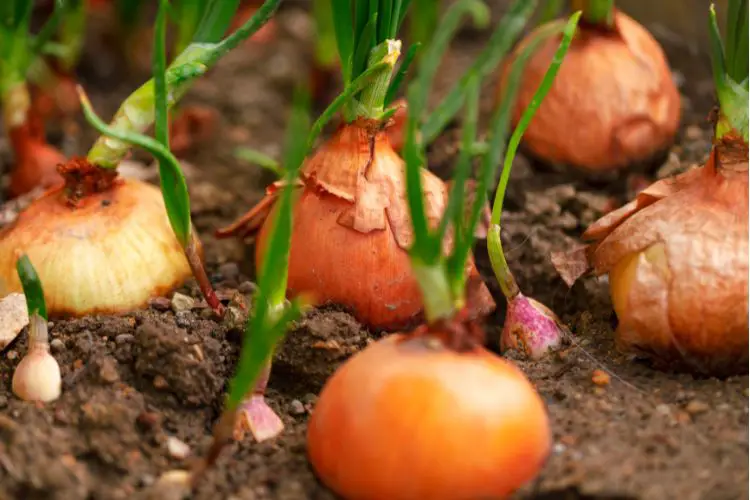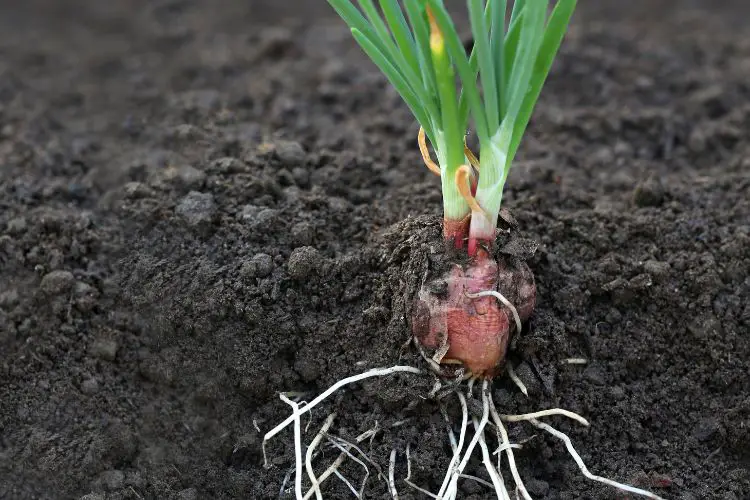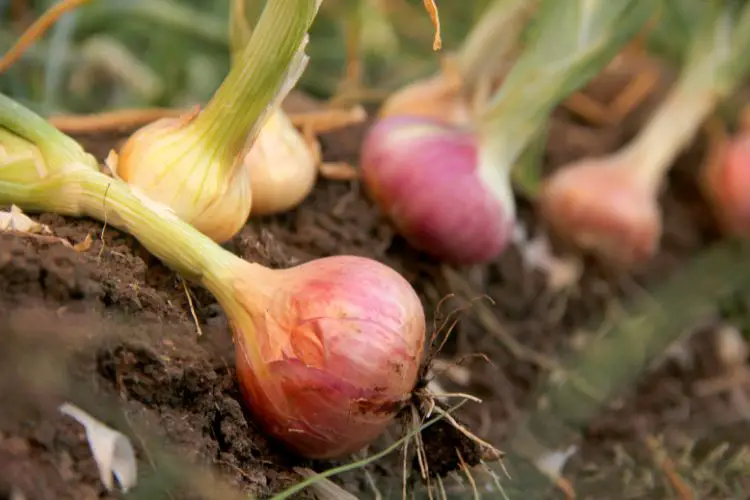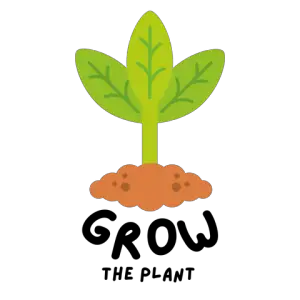Onions, scientifically known as Allium cepa, are versatile vegetables widely used in various cuisines around the world.
With their pungent flavor and distinctive aroma, onions play a crucial role in enhancing the taste of dishes, whether they are sautéed to a golden brown, caramelized for sweetness, or added raw to salads for a spicy crunch.
There are several common types of onions, including yellow onions, red onions, and white onions, each offering a slightly different flavor profile. In addition to their culinary uses, onions are packed with nutrients like vitamin C, vitamin B6, and antioxidants, making them beneficial for overall health.

How to Grow Onions?
Growing onions successfully requires attention to planting depth, spacing, soil quality, watering schedule, and adequate sunlight exposure throughout their growth cycle.
Selecting the right onion variety is crucial for a successful harvest. Varieties such as yellow, red, white, or sweet onions offer different flavor profiles and storage capabilities.
When preparing the soil, ensure it is well-draining and rich in organic matter to support healthy root development. Plant onions in rows with about 4-6 inches apart to allow room for bulb expansion. Water consistently, keeping the soil moist but not waterlogged, especially during the bulb formation stage.
Onions thrive in full sun, so aim for at least 6-8 hours of direct sunlight daily.
Choosing the Right Onion Variety
Selecting the appropriate onion variety based on your climate, intended use, and growing season is crucial for a successful harvest and optimal bulb development.
When choosing an onion variety, it’s essential to consider the climate conditions in your region. Some varieties thrive in cooler climates, while others are better suited for warmer weather. For example, long-day onions require more daylight hours to form bulbs, making them ideal for northern regions with longer summer days. On the other hand, short-day onions develop better in southern regions with shorter daylight hours. Understanding these climate preferences can significantly impact the growth and yield of your onion crop.
Preparing the Soil
Preparing well-draining, fertile soil with organic matter and proper pH levels is essential for supporting healthy onion growth and preventing diseases.
A balanced soil composition is crucial for onions, typically requiring a pH level between 6.0 and 7.5. Organic amendments such as compost or well-rotted manure can improve soil structure, increase water retention, and promote microbial activity. These organic materials also release nutrients slowly, ensuring a steady supply for the onions’ growth.
By incorporating compost or manure into the soil before planting, you can enhance nutrient uptake, reduce the risk of nutrient deficiencies, and support overall soil health. This preparation not only aids in initial onion establishment but also contributes to long-term crop productivity.
Planting Onions
Planting onions can be done using seedlings, sets, or seeds, with each method requiring specific planting depth, spacing, and care to ensure successful growth.
- Seedlings are young onion plants that are usually purchased in trays from nurseries. When planting seedlings, ensure the depth is approximately 1 inch deep and space them about 4-5 inches apart. Water seedlings regularly to keep the soil moist but not waterlogged.
- Sets are small, dry onion bulbs that are planted in shallow holes about 1-2 inches deep, spaced around 4 inches apart.
- Seeds are tiny, and when planting, sow them 1/4 inch deep and thin out the seedlings to maintain spacing of around 2-3 inches apart. Regular weeding and mulching help to control weeds and maintain soil moisture levels for healthy onion growth.
Caring for Onions
Providing adequate water, regular weeding, and mulching to conserve moisture are essential steps in caring for onions and promoting healthy bulb development.
- Watering onions is crucial to ensure they receive consistent moisture without becoming waterlogged. Typically, onions need about 1 inch of water per week, either from rainfall or irrigation. It’s important to water deeply but infrequently to encourage their roots to grow deep into the soil.
- When weeding around onions, be careful not to disturb their shallow root systems. Mulching with organic materials like straw or grass clippings can help retain moisture, suppress weeds, and regulate soil temperature, creating the ideal conditions for optimal onion growth.
Harvesting Onions
Knowing the right time to harvest onions, proper curing methods, and suitable storage conditions are crucial for preserving the quality and flavor of onion bulbs.
When it comes to determining the right time for harvesting onions, it’s essential to look for signs such as the tops of the plants turning yellow and falling over. Once harvested, curing the onions involves letting them dry in a well-ventilated area until the outer skin becomes papery. This process helps to seal in moisture and enhance the onions’ storage longevity. For optimal storage, onions should be kept in a cool, dry place with good air circulation to prevent them from sprouting or molding.
What Are the Different Types of Onions?
Onions come in various types, including yellow onions, white onions, red onions, sweet onions, and green onions, each with its unique flavor profile and culinary applications.
Yellow onions are versatile and commonly used in a wide range of dishes due to their strong, pungent flavor, making them perfect for sautéing or caramelizing.
White onions have a milder taste compared to their yellow counterparts, ideal for fresh salsas and guacamole.
Red onions offer a vibrant color and mild sweet flavor, often incorporated in salads and pickling.
Sweet onions, such as Vidalia or Walla Walla, have a notably sweet taste, making them great for grilling or enjoying raw.
Green onions, also known as scallions, provide a mild onion flavor and are fantastic as a garnish or in stir-fries.
Yellow Onions
Yellow onions are one of the most common onion varieties known for their pungent flavor and versatile cooking applications in both raw and cooked dishes.
Known for their intense flavor, yellow onions add a robust depth to dishes when cooked, becoming sweet and caramelized. These onions are perfect for long-term storage due to their thick, papery skin, allowing them to be used weeks after purchase. Yellow onions are essential in classic recipes like French onion soup, onion rings, and caramelized onion tart. They are also frequently featured in stir-fries, stews, and sauces, enhancing the overall savory profile of the dish.
White Onions
White onions are milder in flavor compared to yellow onions, with a slightly sweet taste, making them a great choice for fresh salsas, salads, and guacamole.
Their delicate and subtle flavor profile also makes them perfect for adding a refreshing crunch to sandwiches and wraps. Besides their flavor, white onions have a crisp texture that holds up well when raw, enhancing dishes with a satisfying bite. When thinly sliced, they can be pickled to create tangy condiments or used as a topping for tacos and burgers.
In terms of cultivation, white onions thrive in well-draining soil and require full sun to flourish, making them a versatile addition to any home garden. Chefs often choose white onions for their ability to complement other ingredients without overpowering the overall dish, showcasing their versatility in various culinary applications.
Red Onions
Red onions offer a vibrant hue and a mildly sweet flavor, making them a popular choice for salads, pickling, and grilling due to their beautiful color and crunchiness.
Their striking red-purple color not only adds visual appeal to dishes but also signifies a higher concentration of antioxidants, making them a nutritious choice. Their distinct taste profile, less pungent than yellow or white onions, adds a delicate touch to dishes without overpowering other flavors.
Whether thinly sliced for salads, pickled for tangy toppings, or grilled to enhance their natural sweetness, red onions bring a versatile element to culinary creations. Cultivated in various regions, these onions are known for their ability to thrive in different climates, contributing to their widespread availability and culinary versatility.
Sweet Onions
Sweet onions, like Vidalia and Walla Walla, are renowned for their mild and sweet flavor, ideal for raw consumption in sandwiches, salads, and relishes.
Their unique sweetness makes them a versatile ingredient in various fresh dishes, adding a delicate depth of flavor without overpowering other ingredients. Vidalia onions, known for their low sulfur content due to the specific soil composition in Georgia, offer a crisp texture and subtle sweetness that pairs perfectly with fresh herbs in salsas or guacamole.
Walla Walla onions, grown in the fertile soils of Washington state, are prized for their juiciness and mild taste, making them a delightful addition to summer slaws or atop burgers for that extra touch of sweetness.
Green Onions
Green onions, also known as scallions or spring onions, offer a mild onion flavor and are commonly used as garnishes, in salads, and as a topping for various dishes.
Their versatility extends beyond mere garnishing, as their vibrant green color adds a fresh pop to any dish. These onions are widely appreciated for their ability to complement a wide range of cuisines, from Asian stir-fries to Mexican salsas.
Cultivating green onions is relatively easy, requiring minimal space and attention, making them a popular choice for home gardeners. In the kitchen, they can be used to add a subtle onion taste without overpowering other flavors, making them a versatile and essential ingredient for both novice and seasoned cooks.
What Are the Nutritional Benefits of Onions?

Onions are packed with essential nutrients, including vitamins C and B6, potassium, and dietary fiber, offering numerous health benefits and contributing to a balanced diet.
Vitamin C in onions acts as a powerful antioxidant, supporting the immune system and aiding in collagen production for healthy skin. Meanwhile, the B6 vitamin plays a crucial role in metabolism and cognitive function. Potassiumhelps regulate blood pressure and fluid balance in the body, promoting cardiovascular health. The fiber content in onions aids digestion and helps with weight management by providing a feeling of fullness.
Incorporating onions into meals can enhance flavor profiles while boosting the nutritional value of dishes.
What Are the Health Benefits of Onions?
Onions possess various health benefits, thanks to their antioxidant properties, potential to reduce inflammation, and positive effects on heart health and blood sugar levels.
They are a rich source of antioxidants, such as quercetin and sulfur compounds, which help combat free radicals in the body and protect cells from damage. These compounds also have anti-inflammatory effects that may reduce the risk of chronic diseases like heart disease and diabetes. Studies have shown that incorporating onions into your diet can improve cardiovascular health by lowering cholesterol levels and blood pressure. The sulfur compounds in onions have been linked to improved blood sugar regulation, making them a valuable food for diabetes management.
Anti-inflammatory Properties
Onions contain compounds that exhibit anti-inflammatory properties, which may help reduce inflammation and lower the risk of chronic diseases.
One of the key compounds found in onions, known as quercetin, plays a vital role in combating inflammation by inhibiting certain inflammatory pathways in the body. This natural antioxidant not only helps in reducing inflammation but also supports the immune system.
By including onions in your diet regularly, you can potentially benefit from their anti-inflammatory effects and contribute to overall well-being. Incorporating onions into various dishes can be a flavorful way to harness their health-promoting properties and aid in disease prevention.
Boosts Immune System
Onions are rich in nutrients that can bolster the immune system, aiding in disease resistance and overall immune function.
They are packed with vitamin C, an antioxidant that helps to fight off harmful free radicals and support immune health. Onions contain quercetin, a powerful phytochemical that has anti-inflammatory properties and can enhance immune response. By including onions in your diet regularly, you can boost your body’s natural defense mechanisms and potentially reduce the risk of various illnesses. The antimicrobial properties of onions further contribute to their immune-boosting effects, making them a valuable addition to your overall well-being.
Promotes Healthy Digestion
Onions contain dietary fiber and prebiotics that promote healthy digestion, supporting gut health and regularity.
Fiber is essential for maintaining a healthy digestive system as it helps in moving food through the intestines and promotes regular bowel movements. The prebiotics in onions serve as food for the beneficial bacteria in the gut, aiding in their growth and balance. By nourishing the gut microbiota, onions contribute to overall well-being and immune function. These prebiotic properties of onions help in reducing inflammation in the gut and improving nutrient absorption.
Including onions in your diet can positively impact your digestive wellness and enhance your overall health.
May Help Lower Risk of Certain Cancers
Some studies suggest that the compounds in onions may have protective effects against certain types of cancer, potentially reducing the risk of cancer development.
These protective effects are attributed to compounds like quercetin and organosulfur compounds present in onions. Quercetin, a powerful antioxidant, has been shown to have anti-inflammatory and anticancer properties. The organosulfur compounds in onions have been linked to inhibiting the growth of cancer cells and promoting apoptosis, or programmed cell death. Studies have demonstrated that regular consumption of onions may help in preventing the onset of certain cancers by neutralizing free radicals and supporting healthy cellular function.

Tips for Growing Onions Successfully
To ensure successful onion growth, consider factors such as proper fertilization, pest control measures, disease prevention strategies, and regular monitoring for optimal plant health.
Implementing the right fertilization techniques is essential in providing onions with the nutrients they need. Opt for a balanced fertilizer with a higher phosphorus content to promote root development and bulb formation.
When it comes to pest management, encourage beneficial insects like ladybugs and lacewings to control common onion pests naturally.
Practicing crop rotation can help minimize the risk of diseases affecting your onion crop. Stay vigilant in monitoring your plants for any signs of distress and address issues promptly to maintain a thriving onion garden.
Frequently Asked Questions
What is the best time of year to plant onions?
The best time to plant onions is in the early spring, as soon as the ground can be worked. Onions prefer cool temperatures and can be planted as soon as the soil is workable.
How much space do onions need to grow?
Onions should be planted about 4-6 inches apart in rows spaced 12-18 inches apart. This allows enough room for the bulbs to grow and develop.
What type of soil is best for growing onions?
Onions prefer well-drained, sandy loam soil with a pH between 6.0-7.0. It is important to avoid heavy, compacted clay soil as it can stunt onion growth.
Do onions need a lot of water to grow?
Onions require consistent moisture, but do not like to be waterlogged. Aim for 1-2 inches of water per week, either from rain or irrigation.
How long does it take for onions to fully mature?
Onions typically take 3-4 months to fully mature, depending on the variety. You will know they are ready when the tops start to yellow and fall over.
Can onions be grown in containers?
Yes, onions can be grown in containers as long as they have enough space to grow and proper drainage. A container that is at least 8-10 inches deep is recommended for growing onions.
